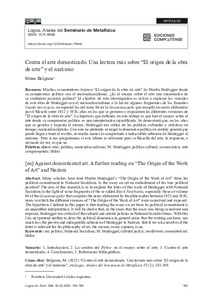Por favor, use este identificador para citar o enlazar este ítem:
https://repositorio.uca.edu.ar/handle/123456789/17216| Título: | Contra el arte domesticado : una lectura más sobre “El origen de la obra de arte” y el nazismo Against domesticated art : a further reading on “The origin of the work of art” and nazism |
Autor: | Belgrano, Mateo | Palabras clave: | ARTE; POLITICA; NACIONALSOCIALISMO; POLITICA CULTURAL; Heidegger, Martin, 1889-1976; COSMOVISION; Hitler, Adolf | Fecha de publicación: | 2022 | Editorial: | Universidad Complutense de Madrid | Cita: | Belgrano, M. Contra el arte domesticado : una lectura más sobre “El origen de la obra de arte” y el nazismo [en línea]. Logos. Anales del Seminario de Metafísica. 2022, 55 (2). doi: 10.5209/asem.79846. Disponible en: https://repositorio.uca.edu.ar/handle/123456789/17216 | Resumen: | Resumen: Muchos comentadores leyeron “El origen de la obra de arte” de Martin Heidegger desde
su compromiso político con el nacionalsocialismo. ¿Es el ensayo sobre el arte una encarnación de
su verdadera posición política? El objetivo de esta investigación es volver a explorar los vínculos
de esta obra de Heidegger con el nacionalsocialismo a la luz de algunos fragmentos de los llamados
Cuadernos negros, en especial los del tomo 94 de la Gesamtausgabe que recopila las notas elaboradas
por el filósofo entre 1932 y 1938, años en los que se gestaron y expusieron las diferentes versiones de
“El origen de la obra de arte”. La hipótesis que defiendo en este trabajo es que leer el ensayo sobre el
arte desde su compromiso político es una interpretación injustificada. Se demostrará que, en los años
que se gestaba y exponía el ensayo, Heidegger era crítico de las políticas culturales y artísticas en
tiempos nacionalsocialistas. Con esto no pretendo ni negar la dimensión política en sentido general que
puede llegar a tener el escrito, ni mucho menos la comprobada e indiscutible adhesión de Heidegger al
nazismo. Pero si nos preguntamos si esto último es relevante para su filosofía del arte, la respuesta, a
mi modo de ver, es que no. Abstract: Many scholars have read Martin Heidegger’s “The Origin of the Work of Art” from his political commitment to National Socialism. Is the essay on art an embodiment of his true political position? The aim of this research is to re-explore the links of this work of Heidegger with National Socialism in the light of some fragments of the so-called Black Notebooks, especially those of volume 94 of the Gesamtausgabe that compiles the notes elaborated by the philosopher between 1932 and 1938, years in which the different versions of “The Origin of the Work of Art” were conceived and exposed. The hypothesis I defend in this paper is that reading the essay on art from its political commitment is an unjustified interpretation. It will be shown that, in the years that the essay was being conceived and exposed, Heidegger was critical of the cultural and artistic policies in National Socialist times. With this I do not pretend neither to deny the political dimension in general sense that the writing can have, nor much less the proven and indisputable adhesion of Heidegger to Nazism. But if we ask ourselves if the latter is relevant for his philosophy of art, the answer, in my opinion, is no. |
URI: | https://repositorio.uca.edu.ar/handle/123456789/17216 | ISSN: | 1575-6866 (impreso) 1988-3242 (online) |
Disciplina: | FILOSOFIA | DOI: | 10.5209/asem.79846 | Derechos: | Acceso abierto | Fuente: | Logos. Anales del Seminario de Metafísica. 2022, 55 (2) |
| Aparece en las colecciones: | Artículos Artículos |
Ficheros en este ítem:
| Fichero | Descripción | Tamaño | Formato | |
|---|---|---|---|---|
| contra-arte-domesticado-lectura.pdf | 474,62 kB | Adobe PDF |  Visualizar/Abrir |
Visualizaciones de página(s)
50
comprobado en 27-abr-2024
Descarga(s)
32
comprobado en 27-abr-2024
Google ScholarTM
Ver en Google Scholar
Altmetric
Altmetric
Este ítem está sujeto a una Licencia Creative Commons

